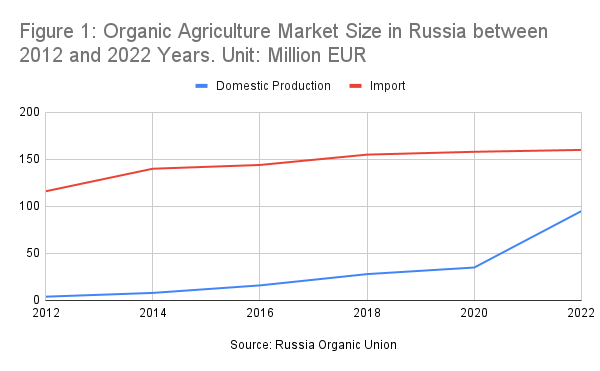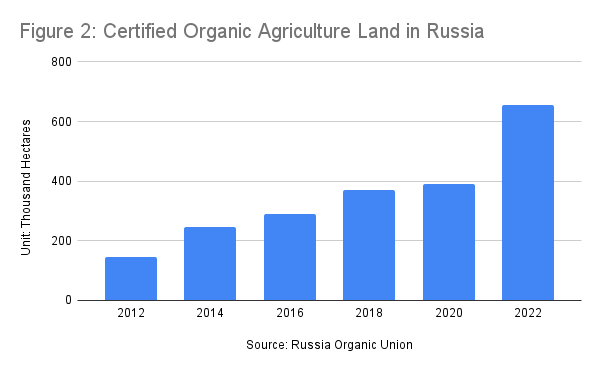Does Russia Have Enough Potential to Become a Leading Country in Organic Agriculture?

With vast amounts of agricultural land and favorable climate conditions in some regions, Russia has the potential to become a leading country in organic agriculture. Traditional farming practices in Russia have often been closer to organic methods, with limited use of chemicals and a focus on natural processes. This heritage can serve as a foundation and be adapted to modern organic farming practices. Furthermore, global demand for organic food is on the rise and Russia can further add to this given its large domestic market. The country has the potential to tap into this demand by developing its organic agriculture sector.
In 2022, the Ministry of Agriculture of the Russian Federation announced the Strategy for the Development of Organic Production in the Russian Federation until 2030. It aims to increase the production of organic products from RUB 9.1 billion (equivalent to USD 103 million) in 2021 to RUB 114.5 billion (equivalent to USD 1.3 billion) by 2030. Russia's ambitious plan to play an important role in the global organic products market requires enormous effort. This short analysis attempts to review Russia’s organic agriculture and to understand the market’s potential.
The Law on Organic Products was adopted relatively recently in Russia. It was accepted on August 3, 2018 and enforced starting January 1, 2020. Despite Russia having a short history in organic legislation, the Russian organic products market showed a fairly intensive growth of 10% YoY between 2010 and 2014. However, with the start of the Crimean crisis in 2014 and the effects of western sanctions on Russia, the growth rate was reduced to about 4% YoY. The situation recovered again starting 2017, when it reached a steady growth of 8 to10% YoY.

As shown in Figure 1, Russia demonstrates constant growth in the organic products market for the last decade. It can be noted that Russia was heavily dependent on foreign imports, mostly from European countries. However, domestic production of organic products has been increasing since 2020.
According to the National Organic Union of Russia, certified organic land in Russia reached 655 thousand ha in 2022, a 67% increase compared with 2020 (See Figure 2). A significant increase in organic agriculture land is explained with the introduction of the Federal Law on Organic Agriculture from 2020, as well as various government initiatives to support local organic farmers.

In conclusion, while the Russian organic products market shows positive growth with a reduction in import dependency and an increase in domestic production, it still represents a small share of the global organic products market. The government's introduction of necessary regulations, strategies, and initiatives to support organic agriculture is promising. However, Russia's underperformance in organic agriculture, considering its potential and natural resources, suggests room for further development. The future of Russia's organic agriculture market remains uncertain, particularly given the current geopolitical conflict over Ukraine. Continued efforts to address challenges, such as infrastructure, certification, education, and market development, will be crucial to unlock the full potential of organic agriculture in Russia.
For Further Information, Please Check Out Upcoming Report on Organic Produce in the CIS Region: Current Status, Challenges and Perspectives.




